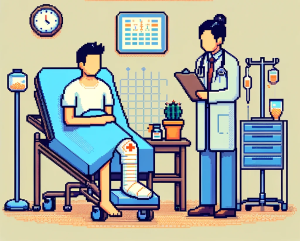
Evidence-Informed Policy Making in Healthcare: A Path to Better Public Health Decisions
The influence of scientific research on policy making, particularly in healthcare, cannot be overstated. It is a cornerstone for formulating policies that are not only effective but also efficient, equitable, and grounded in the best available evidence. However, the transition from research to policy is fraught with complexities and challenges.
This article explores the dynamics of Evidence-Informed Policy Making (EIPM) in healthcare, analyzing different models aimed at optimizing this process and outlining their strengths and limitations.
Understanding EIPM: What Does It Mean?
EIPM is a methodology that involves the systematic, transparent assessment and incorporation of scientific evidence into policy-making decisions. This approach has historical roots stretching back to before World War II and is akin to evidence-based decision-making practices in clinical care, which integrate research with clinical expertise and patient values to enhance healthcare outcomes.
Yet, despite the apparent benefits, the adoption of research into policymaking is often a turbulent, nonlinear process influenced by various historical, sociopolitical, and institutional factors. This complexity has given rise to multiple models designed to facilitate EIPM, each with unique strengths and challenges.
Reviewing Models of EIPM: A Closer Look
A comprehensive review was conducted to critically assess nine distinct models of EIPM in healthcare. Each model offers frameworks for applying research evidence to policymaking, yet they often fall short of addressing the full complexity of the policy-making environment. Common shortcomings include the presumption of rational policy-making, inadequate consideration for urgent policy demands, and insufficient guidance for applying evidence in diverse and complex scenarios.
Key Findings from the Review
- Flexibility and Comprehensiveness: Most models offer a certain degree of flexibility and are comprehensive in theoretical foundations. However, they struggle with practical applications in dynamic and complex policy situations.
- Cultural and Contextual Sensitivity: Many models do not adequately consider the specific cultural and institutional contexts in which policies are made, which can limit their applicability across different regions.
- Guidance on Collaboration: There is often limited advice on how to effectively foster collaboration between researchers and policymakers, which is crucial for the successful integration of evidence into policy.
Innovative Approaches to Enhance EIPM
To overcome these limitations, future models could benefit from integrating insights from sociology of knowledge, change theory, and complexity science. These perspectives offer deeper understanding of how policies are formed and influenced by a myriad of factors beyond straightforward evidence application.
Implications for Policymaking
By refining EIPM models to address these gaps, policymakers can better navigate the intricate process of transforming scientific data into actionable policies. This not only improves the quality of healthcare policies but also ensures that they are resilient and adaptable to future challenges.
Engage with Us
We invite you to join the conversation on how research can be more effectively translated into healthcare policy. Share your experiences, ideas, or questions in the comments below or through our social media channels. Let’s collaborate to enhance the impact of scientific research on public health.
Empower Your Public Health Journey – Subscribe and Transform!
Unlock the transformative power of knowledge with ‘This Week in Public Health.’ Each issue is a treasure trove of insights into crucial research, community health achievements, and advocacy strategies. Don’t just read about change – be the agent of it. Subscribe for free and start making an impact with each edition!
About the Author
Jon Scaccia, with a Ph.D. in clinical-community psychology and a research fellowship at the US Department of Health and Human Services with expertise in public health systems and quality programs. He specializes in implementing innovative, data-informed strategies to enhance community health and development. Jon’s significant contribution to public health is underscored by his creation of the R=MC² readiness model, which aids organizations in effectively navigating change. And strongly believes that policy is an underutilized method to facilitate community-level change.



